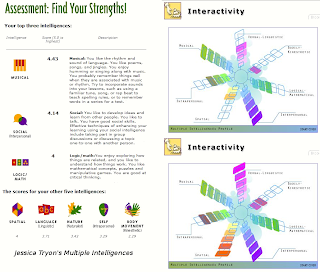Here's some fun quizzes we had to take for our discussion post:
- Multiple Intelligence Interactivity
http://www.thirteen.org/edonline/concept2class/mi/index.html
Note: Scroll down and click on the “Interactivity” to create your “M.I. Snowflake.” - Quiz for Emotional Intelligence
http://psychology.about.com/library/quiz/bl_eq_quiz.htm? - Multiple Intelligences for Adult Literacy and Education.
http://literacyworks.org/mi/assessment/findyourstrengths.html

Book recommendation for Multiple Intelligences: How am I smart? by Dr. Kathy Koch (pronounced 'cook'). Originally written for jr. high/high school kids, it's now marketed to parents. It's a very easy read, quite fascinating; she also includes tips and ideas for how to create an environment to implement them in learning and every day life.
Here's the results of my Emotional Intelligence (EQ - test 2). Sorry, no spiffy chart. I wish there was!:
"Your results indicate an above average score on emotional intelligence.
What Does Your Score Mean?
People with a better than average score on emotional intelligence tend to be good at interpreting, understanding, and acting upon emotions. They are usually quite good at dealing with social or emotional conflicts, expressing their feelings, and dealing with emotional situations.
It's important to remember that no matter how good your score is, there is always room to improve your emotional intelligence. Consider areas where you are not as strong and think of ways that you can learn and grow. Take stock of your strong points and find ways to continue to develop and apply these skills."
How about you?

1 comment:
These are pretty ridiculous questions... the EQ one in particular is driving me nuts. A lot of my answers would be "well it depends..." because you have to read the situation a little more finely than what they're saying. Or I wouldn't do any of their suggestions but something in between them. (e.g. I would go *talk* to a professor and see how I could improve projects, rather than confront them and ask for a better grade, or just "think about" what I could do better - obviously I need to talk to the prof so I better meet their expectations, and so that I know what those expectations are)
Anyway. I hope your class also covers why these kinds of things are a) often skewed and b) very different for different classes and/or races c) biases in self-reporting surveys
-astrogeek01 (who is having a hard time posting with openID for some reason)
Post a Comment